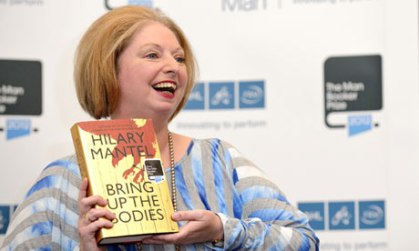Whether it’s the Bad Sex award given to the author of the most cringe-worthy sex scene in literature each year or coveted literary prizes such as the Booker and the Pulitzer, book awards attract a lot of attention. They also attract a considerable amount of debate particularly concerning the worthiness of winners. So do we actually need them and what do they really achieve?
Regular followers of this blog will know that I read quite a lot of books which are nominated for the Booker Prize and other similar literary awards. I don’t read these books purely because they are on the shortlist and I certainly wouldn’t rush out and buy the whole lot straight after the announcement. Like most people, I still choose books almost entirely according to personal recommendations and general browsing rather than the number of prestigious awards they have won. However, I am always intrigued by what it is about them that got them recognised and nominated in the first place so I do try and hunt down the ones I think I might enjoy and have heard generally good things about. Awards help draw attention towards some of the forgotten gems among the dross. This can only be a good thing. Clearly, nominations are very important for little-known authors who will finally get widespread recognition for their work. Of course, at the end of the day, publishers and authors also need to sell their books. Awards are just about the best publicity you can get so the guaranteed sales spike is always going to be welcomed. This list of Booker Prize winners according to actual UK book sales since 1998 is particularly interesting – I wonder how many of those copies of ‘Midnight’s Children’ have actually been read?
Eventual winners can often prove to be a disappointment though, leading many to question the actual value of such prizes. Only the test of time will judge whether or not the novels are truly enduring and achieve genuine popularity. Even then, you still can’t please all the people all the time. There are some Booker Prize winners that I like (The Sense of an Ending by Julian Barnes and The Remains of the Day by Kazuo Ishiguro ) and some that I didn’t like much at all (The Gathering by Anne Enright and Possession by A.S. Byatt). Even the criteria for awards can sometimes be vague and subjective – what actually is literary fiction? How can you even begin to compare ‘Room‘ by Emma Donoghue against The Finkler Question by Howard Jacobson which were both nominated for the Booker in 2010? Does it actually matter who even wins or is it just the nominations that count?
Generally, I don’t think the general principles behind book awards are a total waste of time. Celebrating literary excellence and putting the spotlight on otherwise overlooked authors are essentially good things. But perhaps the blatant pretentiousness that surrounds these events can be an unwelcome distraction.







Reblogged this on Annette J Dunlea Irish Author.
LikeLike
These days the Booker prize winner stays on my “Perhaps” list until I hear enough raves from ordinary readers to make me shift it to my “Must Read” list. I think there’s quite a difference between books liked by writers and professional book people to the kind of books we mere mortals like myself read and enjoy. I like the Long and short lists – just don’t ask me to agree with the eventual winner. I still haven’t managed to get through Wolf Hall !
LikeLike
Interestingly, I have tried to read Wolf Hall on two occasions, and haven’t got beyond p100………
LikeLike
I was a History minor and I specialized in the Tudor period. I got through Wolf Hall, but liked it much less than The Children’s Book by AS Byatt, which was also shortlisted that year. I’m reading Bring Up the Bodies now, and liking it much better than the first. It’s shorter, but also more inside Cromwell’s head as he’s haunted by memories and imaginings of deceased friends, family and foes. If the subject matter interests you, try Bring Up the Bodies…you don’t have to read Wolf Hall to “get it”…you just have to know the basic Henry-Katherine-Anne story to jump right in.
LikeLike
Thanks for that. Will read the Byatt .
LikeLike
Consider the recent elections in the United States, one candidate won and the other lost … does that mean that one was so much better than the other? Okay, bad example, obviously one was a comic book and a boring one at that, but the analogy does fit in some ways: almost half of the country would rather read one book than the other yet only one book gets the prize.
What really is ridiculous isn’t necessarily the literary awards that are the result of a learned panel reviewing the choices but rather those that are based on sales figures. Imagine if the Nobel committee made their selection based on the amount of money or the number of copies a publisher moved to assure a substantial level of greedy profits.
This, I believe, is called the Harry Potter effect … ask Harold Bloom.
LikeLike
I think awards are needed, they highlight certain writers and their works and there is such a wide range of awards that you no matter the genre, they can receive an award. However, when the Booker shortlist is announced every year, by Google Reader has the very same posts: all bloggers talking about the same authors and books. Of course, it is interesting but I get bored, it is as if Hilary Mantel hadn’t existed before she was shortlisted.
LikeLike
A great post. I have a very similar opinion to what you’ve written here about awards. I hadn’t heard of Julian Barnes before he won the Booker for The Sense of An Ending and now he is one of my favourite authors. Prizes are great for exposure and such but sometimes the hype can be too much.
A couple of years ago there was a lot of talk about ‘readability’ and whether a book should be awarded for its readability quality, whatever that means. It made me crazy. I don’t believe the ‘best’ book has been awarded a prize. The nominations are just as important to me as the winner. The winner is inconsequential.
LikeLike
I have read only one and a bit of the books in your list – I loved The Life of Pi but couldn’t get on at all with The God of Small Things (I’ve just bought it again on Kindle, to have another try, having taken the paperback to a charity shop years ago). I do not like to follow the herd, so like many of your other readers, I look for a personal recommendation or intriguing review. Awards are good for raising awareness of books generally, though…
LikeLike
Enjoyed your post – thought provoking. I try & read the Booker shortlist, but very often am baffled/puzzled/flummoxed by the novels chosen. At the end of the day, its subjective – all readers have their own favourites. I’m glad I’m not a Booker judge : I don’t envy them!
LikeLike
I think it depends on who’s on the panel each year and the award itself. I find that I sometimes get on better with some awards than others and some years are better than others. Like you, I wait for personal recommendations and the old age method of going with the book cover. Iit also helps to only read the book once the hype has died down.
LikeLike
Thanks for a great analysis of award winning books. I agree totally with what you say about the value of these awards to the reader and the author. Not all award winners are very readable, which has often been a pet peeve of mine. Love your blog! If you’ll pardon the pun, we seem to be “on the same page” in many ways. 🙂
LikeLike
Pingback: The Folio Prize: Do We Need Another Literary Award? | A Little Blog of Books and Other Stuff
Pingback: The Women’s Prize for Fiction Shortlist | A Little Blog of Books and Other Stuff
Pingback: The Man Booker Prize: US authors to be considered? | A Little Blog of Books and Other Stuff
Really enjoyable and thoughtful piece.
LikeLike
Thanks – I wrote this a long time ago now but I think my views are still the same!
LikeLike
it came up as one of the things you might be interested in links and I had to check it out. I prefer book clubs mind. I know awards promote discussion and debate, but it’s awful when they choose an unworthy choice.
LikeLiked by 1 person